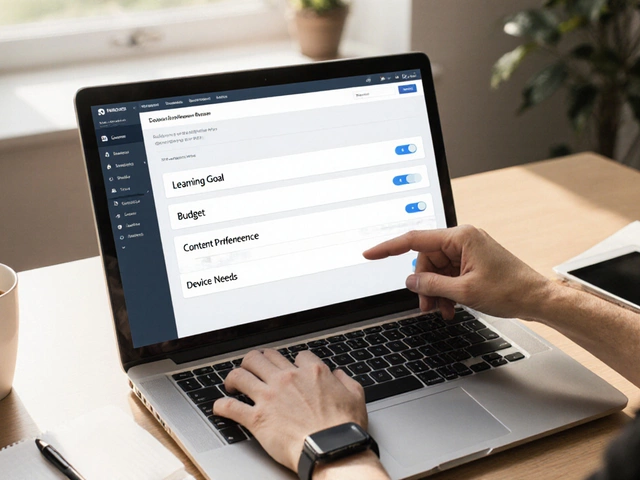
This question keeps popping up all over Reddit and coding forums: do you need to be good at math to code? People get nervous because math class wasn't their thing, and they imagine programming as endless equations and formulas. Spoiler alert—it's mostly not like that. Most coders I know (myself included) spend way more time solving real-world problems, searching Stack Overflow, and thinking creatively than wrestling with hardcore math.
If the thought of algebra makes your palms sweaty, you're not alone. And here's the kicker: for most coding jobs, especially web and app development, fancy math rarely comes up. Sure, if you want to build AI or write code for rocket science, you'll brush up against heavier math. But honestly, everyday programming is more about breaking problems into smaller steps, learning to read code, and knowing how to Google effectively than crunching numbers in your head.
I've seen so many folks, even some scared off by geometry, buckle down and learn to code just fine. And whenever my wife Mira tries to debug her way through a new coding problem, she reminds me that a little grit and curiosity go way further than remembering all those formulas from high school. If you can think logically and aren’t afraid to tinker, you’re already set up to learn coding basics. And that's worth way more than perfect math scores.
- The Math and Coding Myth
- When Math Matters (and When It Doesn't)
- What Actually Makes You a Good Coder
- Tips for Non-Mathy Learners
- Real Stories from Working Coders
The Math and Coding Myth
If you've heard that you need to be a math whiz to even get started with coding, you're definitely not alone. This idea is everywhere—from college advice to movies showing hackers scribbling wild equations on glass boards. But the truth isn't so dramatic. Most programmers write far more regular sentences in code than anything that looks like advanced math.
It's easy to see where the myth comes from. Back in the early days of computers, most programmers came from engineering or scientific backgrounds. Today, the field is wide open. In a 2023 Stack Overflow survey, less than 40% of professional developers said they use advanced math at work. For most, day-to-day coding is about logic, not calculus.
Let’s take a look at what surveyed coders are actually using on the job—spoiler alert, it's not all about numbers:
| Skill used at work | Percent of coders |
|---|---|
| Basic math (arithmetic, counting) | 77% |
| Using Google/Stack Overflow | 92% |
| Algebra or above | 34% |
| Problem-solving logic | 95% |
What’s really fueling the math and coding myth is that a few special areas—like cryptography, data science, or graphics programming—lean hard on math. If you're dreaming about working for NASA or cracking encryption, you'll need more math chops. But most coding classes, jobs, and even side projects steer clear of hardcore formulas.
Here’s what actually matters when you start learning to code:
- Being willing to break a problem into small steps
- Reading instructions and following patterns
- Understanding basic logic (like "if this, then that")
- Trying things out, seeing what works, and fixing what's broken
So the next time you hear someone say “coding is just for math people,” know that it’s an outdated idea. Millions of coders, from artists to business folks, prove every day that programming is way more about creative thinking than math anxiety.
When Math Matters (and When It Doesn't)
This is the section everyone wonders about: do you really need to be good at math to be a coder? The truth depends on what kind of coding you want to do. Let’s break it down with some real examples.
For most front-end web work—building websites with HTML, CSS, and JavaScript—you’ll barely ever need more than basic arithmetic. The same goes for mobile app development or business software. In everyday coding, the big skills are logic and clear problem-solving, not calculus. Most of your math will be figuring out things like grid layouts or scaling an image—stuff you can Google or let a framework handle.
But it’s a different world if you're diving into areas like data science, machine learning, graphics, or game physics. Jobs in these fields may require statistics, linear algebra, or trigonometry. Still, even here, there are tons of libraries and tools that do most of the heavy lifting. You rarely write the math from scratch.
- coding classes for beginners often skip advanced math topics entirely.
- Web and app development needs basic math—think addition, subtraction, percentages.
- Machine learning, game dev, and simulations lean on algebra, stats, and sometimes calculus.
- Most coders use formulas and libraries created by someone else, not their high school math notes.
To give you a real snapshot, here's how important math skills are in different coding areas:
| Field | Math Needed | How Often |
|---|---|---|
| Web Development | Basic arithmetic | Rarely |
| Mobile Apps | Basic arithmetic | Rarely |
| Data Science | Statistics, Probability | Often |
| Game Development | Geometry, Trigonometry | Sometimes |
| AI/Machine Learning | Linear Algebra, Calculus | Often |
| Backend Systems | Logic, Simple Math | Occasionally |
If you’re just starting out or focusing on everyday apps and websites, don’t sweat the math. If you ever end up in a math-heavy field, you’ll learn what you need when you get there—usually in small, manageable steps. And remember: calculators and the internet are always around to help.

What Actually Makes You a Good Coder
Coding isn't a math contest. It's more like building with LEGO for adults—puzzle-solving, not calculus crunching. Sure, a few parts of programming touch math, but the everyday skills that make you a decent coder are things most people already practice in other parts of life.
- Problem-Solving: This is the big one. Coding is all about breaking down bigger problems into tiny pieces. Can't figure something out? Debugging—finding and fixing mistakes—is basically sleuth work with your keyboard.
- Persistence: Getting stuck is part of the deal. Folks who become good coders don’t quit after a few errors. They Google, ask questions, and try again until things click.
- Attention to Detail: Computers are picky. A forgotten comma or a typo in your code will break things. Paying attention to tiny details pays off big time here.
- Communication: This one surprises a lot of people. You have to talk with teammates, explain your logic, and write comments in your code that someone else (maybe even you, months later) can understand.
- Curiosity: The tech world changes fast. Learning new tools, languages, or updates is just part of the ride, so liking to tinker and explore helps a ton.
Here’s a quick look at what actual hiring managers value in entry-level programming jobs—it’s not all about math grades. These stats come from a stack of recent job listings and tech surveys:
| Skill Employers Look For | % of Listings |
|---|---|
| Problem-Solving & Logical Thinking | 92% |
| Teamwork & Communication | 85% |
| Attention to Detail | 78% |
| Specific Programming Languages (e.g. Python, JavaScript) | 74% |
| Advanced Math Knowledge | 12% |
See that last row? Advanced math barely makes a dent in most listings. You’re far better off practicing your math and coding basics—like reading code carefully, thinking out loud, and not being afraid to ask for help—than memorizing trig formulas.
So, if you can stay patient, spot your own bugs, and communicate what you’re thinking, you’re halfway there. Coding is a skill you practice, not an IQ test you pass on day one.
Tips for Non-Mathy Learners
If you’re not a math whiz but still want to dive into coding, here’s some good news: countless real coders started out right where you are. You don’t need to stress about complicated math to join a coding class or start building apps. You just need some clever strategies and the right mindset.
- Focus on logic over math: Computer code is all about telling the computer what to do, step-by-step. It's like giving detailed instructions to a robot. Most programming bugs happen from unclear steps, not missed math problems.
- Use visual resources: Tools like Scratch or Blockly let you build code with blocks instead of numbers, which helps you learn the basics without any math-heavy stuff. Even adult beginners use these to get going.
- Look for beginner-friendly languages: Python, HTML, and JavaScript are some top picks for new coders. They’re beginner-friendly and rarely require anything trickier than basic arithmetic (like adding or counting).
- Join learning groups: Coding bootcamps and online forums have tons of people in the same boat, trading tips and sharing resources. It’s way less scary when you don't go alone.
- Practice real projects: Build a simple website, automate a boring task, or make a small game. These hands-on projects teach you what matters most and help skill-building stick.
Check this quick breakdown from real surveys on what beginner coders actually face when learning:
| Challenge | Percent of Learners |
|---|---|
| Understanding Logic/Concepts | 53% |
| Handling Math Content | 18% |
| Troubleshooting Errors | 29% |
So, less than 1 in 5 new coders say math is their biggest hurdle—logic and debugging trip up way more people.
Don’t forget, Googling is a real skill in coding. Copy and pasting isn’t cheating—it’s learning. Every pro coder has the docs open in one tab and Google in the other. Stack Overflow saves the day more often than any calculator.
If math does ever pop up (maybe you’re curious about graphics or algorithms), tons of free tutorials break it down with examples made for coders, not mathematicians. You can always pick up just enough math as you go, when you actually need it.

Real Stories from Working Coders
If you think every professional coder was a math prodigy, think again. A 2023 Stack Overflow survey found that 37% of working developers don’t use advanced math on the job. So, what does the real world look like for “non-mathy” coders?
Take Sam, who got into web development after managing a coffee shop. Sam says the hardest equation used all year was figuring out how to center a button in CSS—not calculus. Or Priya, who works as a front-end developer for a travel company. Priya swears most of her day is about layouts, fixing bugs, and managing deadlines, not crunching numbers.
Let’s throw in a data scientist’s story just to keep things honest. Alex, who builds recommendation engines, does use statistics and some linear algebra. But Alex points out tools like Python’s pandas and Excel handle the heavy math work, making it more about thinking logically than running calculations by hand.
- Musa, a mobile app dev, admits he never made it past high school geometry. Most of his job involves experimenting with features and testing user experience.
- Jess, a QA tester, says finding bugs is like solving puzzles—no math degree required.
- Over at my house, even Mira, who jumped into coding late, is the go-to for troubleshooting client websites—despite vowing to never touch math after graduation.
If you’re curious how much math and coding overlap in the workplace, check out these findings from the same 2023 Stack Overflow survey:
| Role | Math Use (Daily) |
|---|---|
| Web Developer | 12% |
| Mobile App Developer | 10% |
| Data Scientist | 67% |
| QA Engineer | 7% |
| Game Developer | 55% |
So honestly, unless you’re heading into data science or game design, you can code just fine without a deep math background. Problem-solving, creativity, and curiosity are what you’ll lean on most once you’re out in the real coding world.







